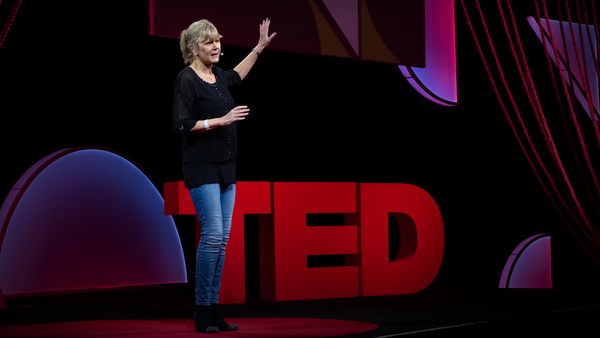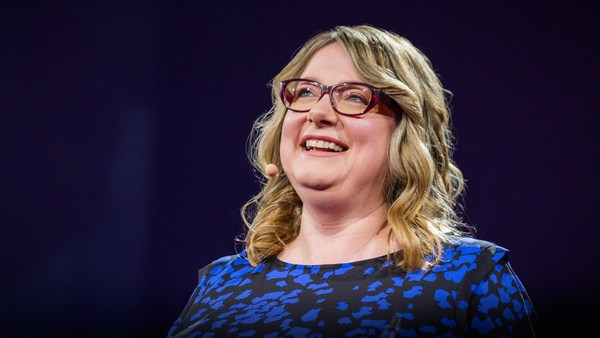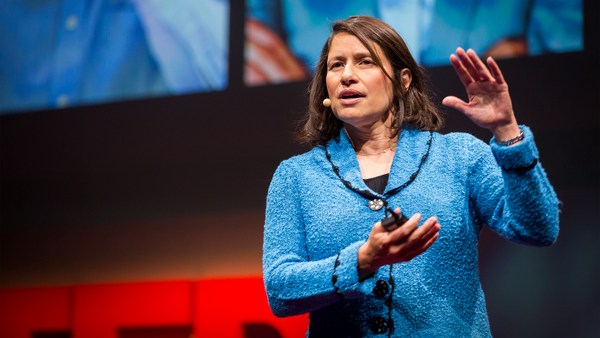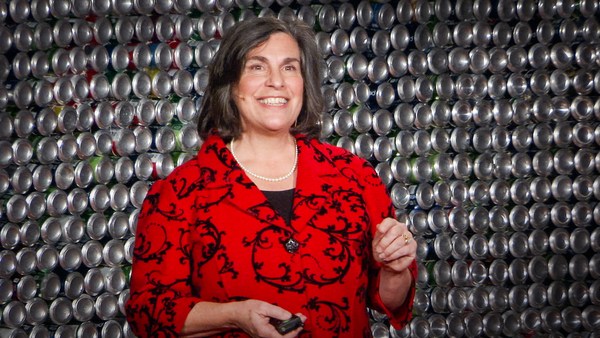Naomi Bagdonas: Alright, so, how often do you laugh at work? I mean really laugh. We asked some of you this question, and here's what we heard. "Rarely." "Seldomly." And then our personal favorite ...
(Laughter)
"I study climate change. Why would I laugh?"
The two of us teach a class at Stanford Business School about the power of humor in leadership.
Jennifer Aaker: Turns out that humor is a teachable skill, and one of the most underappreciated assets at work. For the record, our class on humor gets the same academic credit as financial accounting,
NB: ... which is not a joke.
JA: Here is the problem, though. We've all fallen off a humor cliff. In a global study, over a million people were asked a simple question: "Did you smile or laugh a lot, yesterday?" When we are kids, the answer is "yes." Then, right when we enter the workforce, the answer becomes "no." The good news is things look up again around 80.
(Laughter)
The bad news is the average life expectancy is 78. So ...
(Laughter)
JA: It's not good NB: It's not great.
JA: I’m a behavioral scientist who spent my career studying what actually creates happiness in life versus what we think.
NB: And I'm a corporate strategist who spent my career straddling the worlds of business and improv comedy. Which was a wide straddle. The two of us are on a mission to bring humor back. Over the last decade, we have gathered data, partnered with comedians and talked to leaders about humor. One of them was our friend Connor Diemand-Yauman. Connor is the co-CEO of a large nonprofit, and in early 2020, just weeks after the world went into quarantine, he's leading his first virtual offsite with his entire organization. People are exhausted and scared, it's tense. So Connor shares a few slides before passing to another teammate to speak. But when he does, he intentionally leaves his screen-share on, so his entire organization watches, thinking that this is a terrible mistake. As Connor closes his PowerPoint, opens up a Google search, and types in ... this.
[Things inspirational CEOs say during hard times]
(Laughter)
"Things inspirational CEOs say during hard times."
(Laughter)
Everyone laughs. It's this beautiful moment of levity, and it has real upside for Connor and for his organization, because we know from the research that leaders with a good sense of humor are seen as 27 percent more motivating. Their teams are more bonded and creative.
JA: Also, humor sells. Studies show that adding a lighthearted line into a sales pitch, like "My final offer is x ... And I'll throw in my pet frog," makes people willing to pay nearly 20 percent more. Really let it sink in, just how bad that joke is.
(Laughter)
NB: "I'll throw in my pet frog."
JA: The bar is so low. NB: It's extreme.
(Laughter)
NB: Very low. JA: Could not be lower.
(Laughter)
JA: Laughter shortens the path to connection as well. So when strangers share a laugh before a conversation, they end up disclosing more personal information, so they feel closer. You really laughed hard at that "pet frog" line. I already feel close to you. Don’t we feel close?
JA: Yeah, we feel close.
NB: There's a lot there.
NB: OK, so what's happening is when we laugh, our brains release a cocktail of hormones. So we release endorphins, giving us a similar feeling to a runner’s high; we lower our cortisol, making us feel calmer; and we release dopamine, the same hormone released during sex, making us feel more bonded. So in essence, as far as our brains are concerned, laughing is like exercising, meditating and having sex at the same time.
(Laughter)
But logistically easier.
JA: Also, efficient. NB: Yes.
NB: There's a lot to it. Alright, so humor works. And the really good news that we want to talk about today is that this humor cliff is actually easy to fix.
[GLOBAL HUMOR CLIFF]
(Laughter)
Isn’t that better? 10 years, but we got there. Just a little Sharpie.
OK, the actual good news is that our lives are full of humor, if we know how to look for it.
JA: Here's the secret. Don't look for what's funny, just notice what's true. We asked some of you what's true in your own lives, and here's a few things we heard.
NB: "Since working from home, I only comb the front part of my hair."
(Laughter)
JA: "I only like my own kids ..."
(Laughter)
“There, I said it.”
NB: So this is not about becoming a comedian. This is about looking at the world in a different way. There's a psychological principle called the priming effect that says our brains are wired to see what we've been set up to expect. In essence, we find what we choose to look for. So when we live our lives on the precipice of a smile, we shift how we interact with the world, and in turn, how it interacts back.
JA: It's also about being human, which should be easy, because we are human. But at work, it's oftentimes harder than we think. In a recent survey, people were asked "What traits inspire trust in a leader?" One of the top responses: "Speaks like a regular person." When work gets serious and life gets busy, we become transactional. And yet these small shifts are enough to move us from transactional to human. As small as a single word, like how we often sign off our emails: “Best.” What does "best" even mean? Are you the best? Am I the best? Why do I need to tell you that? We can do better than "best." Instead, how about ...
NB: When you've been up all night -- "Yours heavily caffeinated."
(Laughter)
JA: When you're talking about financial accounting? "Let's never speak of this again."
NB: And on rare occasion, "I'm the best."
(Laughter)
Sometimes, you've just got to let people know.
Now, it's easy to believe that if we take our lives or our mission seriously, the presence of humor betrays that mission. That gravity and levity are somehow at odds. But our research tells a different story.
JA: We met with Secretary of State Madeleine Albright, who told us of the time when the Russian government had bugged the US State Department, a serious breach in international diplomacy. After learning about the bugging, Secretary Albright then went to her next meeting with the Russian foreign minister, wearing a bug pin.
(Laughter)
And enormous bug pin.
(Laughter)
She shared how the foreign minister couldn't help but smile, and she also shared how the energy in the room shifted, and it changed the conversation entirely.
NB: This story illuminates at least two things that are true. First, that humor is a choice, one we make in small moments and in big ones, too. And second, that the balance of gravity and levity gives power to both. We can do serious things without taking ourselves so seriously, and in fact, often, we can do them better, and more fashionably.
JA: Now we often hear that humor can be so tricky these days, and it's true. Comedians know this, which is why they can practice hundreds of times before a line makes it into one of their sets. They also get to wear jeans and drink whiskey at work. It's all very unfair. So how can we, as normal, non-comedian people, practice safe sets? Start by recognizing it's not about you. So don't ask "Will this make me sound funny?" Instead, ask: “How will this make other people feel?”
NB: Which also means never punching down, that is, making fun of someone of lower status. And be sure to check your distance. How close are you personally to what you're making light of? I can make fun of my mother, but not your mother, who, by the way, I hear is a saint, a lovely lady.
JA: An angel.
NB: Our hope today is that you start climbing back up the humor cliff. Start with what's true, and start small. Choose to live on the precipice of a smile. When we do, we create teams, communities and families where joy and laughter come more easily.
JA: Laughing together makes us feel more connected. It floods our brains with the same hormones associated with love. And who doesn't want to feel more joy and love in our lives? Where humor exists, love is not far behind.
NB: And if that doesn't sell you on the power of humor, I will throw in my pet frog.
(Laughter)
NB: Thank you. JA: Thank you so much.
(Applause)





